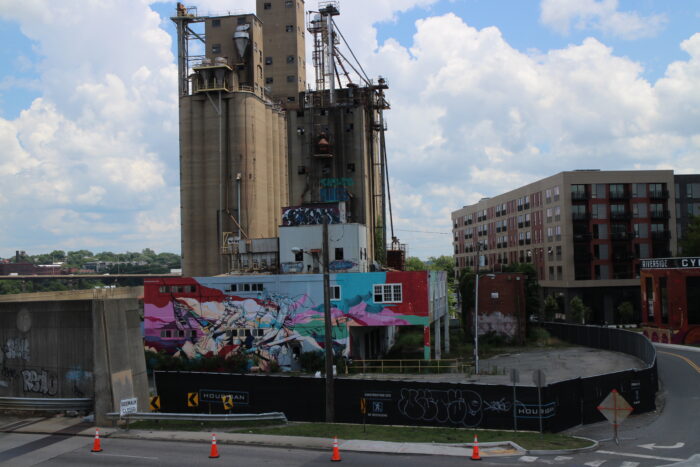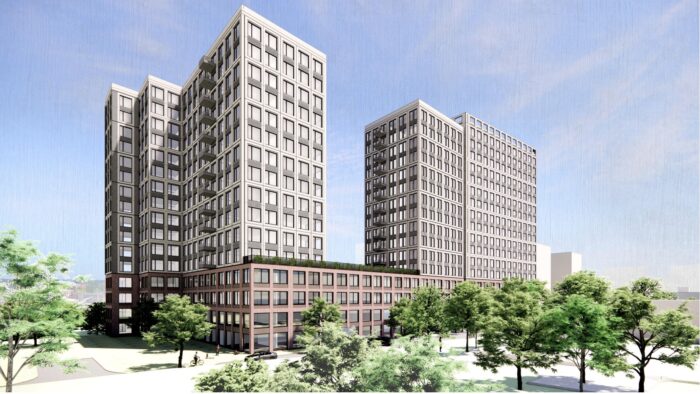A new development that will drastically change the Manchester skyline is a go.
Richmond City Council voted Monday night to approve Avery Hall Investments’ special-use permit application for a pair of high-rise apartment buildings at 301 W. Sixth St. next to Legend Brewing.
Reaching 16 and 17 stories and totaling over 550 units, Avery Hall’s project is one of the highest-density developments proposed in the city in recent years.
A special-use permit was needed due to the buildings’ height, and council approved Avery Hall’s request as part of its consent agenda. It was the final approval needed for the SUP after the city’s Planning Commission similarly approved of the project earlier this month.
Avery Hall partner Jesse Wark said the firm is looking to break ground on the project’s first phase – the taller, 366-unit building and four-story parking deck on the plot’s eastern side – in the first half of 2024.
“It’s hard to give an exact date, but that’s our timeline and we’re pushing hard,” Wark said.
The vote marked the end of a nearly year-long entitlement process for the project.
The Brooklyn-based firm unveiled its plans last July at a meeting of the Manchester Alliance neighborhood association. The property was once planned to house a second phase of River’s Edge with two 11-story buildings, and Avery Hall’s change of plans was met with mixed reactions.
Among those opposed to the project was Legend, the longtime local brewery whose view of downtown and the river is set to be impacted by the new development. Last September Avery Hall returned to Richmond with a tweaked version of the plans, one it says will preserve more of Legend’s view.
A month later, the developers purchased the 3-acre site for more than $17 million, a deal that set the local record for land on a per-acre basis.
Wark said the last year was an extended process but one that allowed the firm to get to know the local community and fine-tune the proposal.
“There were real, valid concerns that we were able to address,” Wark said. “In every market that we are in, there are various hurdles to entitlements and we approach them all in a similar way, trying to make sure that the projects that we bring to communities are appropriate and well-received.”
Avery Hall’s in-house architecture division is designing the building. Wark said a general contractor has not been selected.
Wark described the Sixth Street project as a great introduction to the Richmond market and said that Avery Hall continues to look for development opportunities in the area.
“We’re looking all over but there are obviously some parts of town that are more planned for higher density development and that’s what we do – ground up high-density development,” Wark said.
Density in Manchester was a common theme at Monday’s meeting.
An ordinance for Hourigan Development’s proposed mixed-use redevelopment of the Southern States silos at 2-4 Manchester Road was also introduced to council on Monday.

The decades-old silos are set to be demolished; however, it’s unclear when they’ll come down. (Mike Platania photo)
Hourigan is seeking to raze the vacant silos and build a 20-story, glass-façade apartment building with around 300 units, as well as a six-story office building. The project has been three years in the making and is a rare case of a development needing both a rezoning and special-use permit.
In 2020, Hourigan began the process to rezone the 2.2-acre site to B-4 Central Business District, a request the city approved a year later. Though B-4 allows for unlimited building height, Hourigan’s project needs a special-use permit to get relief from inclined plane and parking and circulation restrictions.
Hourigan’s special-use request now heads back to the Planning Commission, which is set to hear it at its July 17 meeting.
Fencing around the silos has been put up in recent months, however, Williams Mullen’s Preston Lloyd, who’s representing Hourigan, said they don’t have an estimate on when demolition will begin on the site.
“Like every other project in America, the development timeline for this project has elongated given the challenges in the capital and credit markets, and this project is navigating some of those same challenges,” Lloyd said.
A new development that will drastically change the Manchester skyline is a go.
Richmond City Council voted Monday night to approve Avery Hall Investments’ special-use permit application for a pair of high-rise apartment buildings at 301 W. Sixth St. next to Legend Brewing.
Reaching 16 and 17 stories and totaling over 550 units, Avery Hall’s project is one of the highest-density developments proposed in the city in recent years.
A special-use permit was needed due to the buildings’ height, and council approved Avery Hall’s request as part of its consent agenda. It was the final approval needed for the SUP after the city’s Planning Commission similarly approved of the project earlier this month.
Avery Hall partner Jesse Wark said the firm is looking to break ground on the project’s first phase – the taller, 366-unit building and four-story parking deck on the plot’s eastern side – in the first half of 2024.
“It’s hard to give an exact date, but that’s our timeline and we’re pushing hard,” Wark said.
The vote marked the end of a nearly year-long entitlement process for the project.
The Brooklyn-based firm unveiled its plans last July at a meeting of the Manchester Alliance neighborhood association. The property was once planned to house a second phase of River’s Edge with two 11-story buildings, and Avery Hall’s change of plans was met with mixed reactions.
Among those opposed to the project was Legend, the longtime local brewery whose view of downtown and the river is set to be impacted by the new development. Last September Avery Hall returned to Richmond with a tweaked version of the plans, one it says will preserve more of Legend’s view.
A month later, the developers purchased the 3-acre site for more than $17 million, a deal that set the local record for land on a per-acre basis.
Wark said the last year was an extended process but one that allowed the firm to get to know the local community and fine-tune the proposal.
“There were real, valid concerns that we were able to address,” Wark said. “In every market that we are in, there are various hurdles to entitlements and we approach them all in a similar way, trying to make sure that the projects that we bring to communities are appropriate and well-received.”
Avery Hall’s in-house architecture division is designing the building. Wark said a general contractor has not been selected.
Wark described the Sixth Street project as a great introduction to the Richmond market and said that Avery Hall continues to look for development opportunities in the area.
“We’re looking all over but there are obviously some parts of town that are more planned for higher density development and that’s what we do – ground up high-density development,” Wark said.
Density in Manchester was a common theme at Monday’s meeting.
An ordinance for Hourigan Development’s proposed mixed-use redevelopment of the Southern States silos at 2-4 Manchester Road was also introduced to council on Monday.

The decades-old silos are set to be demolished; however, it’s unclear when they’ll come down. (Mike Platania photo)
Hourigan is seeking to raze the vacant silos and build a 20-story, glass-façade apartment building with around 300 units, as well as a six-story office building. The project has been three years in the making and is a rare case of a development needing both a rezoning and special-use permit.
In 2020, Hourigan began the process to rezone the 2.2-acre site to B-4 Central Business District, a request the city approved a year later. Though B-4 allows for unlimited building height, Hourigan’s project needs a special-use permit to get relief from inclined plane and parking and circulation restrictions.
Hourigan’s special-use request now heads back to the Planning Commission, which is set to hear it at its July 17 meeting.
Fencing around the silos has been put up in recent months, however, Williams Mullen’s Preston Lloyd, who’s representing Hourigan, said they don’t have an estimate on when demolition will begin on the site.
“Like every other project in America, the development timeline for this project has elongated given the challenges in the capital and credit markets, and this project is navigating some of those same challenges,” Lloyd said.




Important things are happening in Manchester. Let’s close the Mayo Island Bridge to vehicular traffic and solve pedestrian problems on both sides of the bridge, thereby creating one of the most beautiful parks in the Commonwealth on that island. It has to close for three years anyway if the government wastes $100M in building a new bridge in the floodplain, so why not save the money (divert it to better causes?!!) and make the closure permanent?
If they close the bridge to vehicular bridge, they should put a little money in to maintain the bridge for bicycles and pedestrians. Keep a little history too while your at it.
Repeatedly beating this drum here is not going to get that to happen. You need to talk to people who have more control over this from the state and the City. You will also need to get buy in from the properties owners in Manchester who have invested considerable sums.
The apartment developers are aboard.
Ya never know how much bottom-up information gets high up.
Indeed, on countless occations, an ambitious or mildly narcisistic politician takes credit for an idea that was bubbling up from the Nobodies.
It’s actually in my list of Shawn Harper’s Secrets of Success: Number 3: Take credit for other people’s ideas. (but don’t violate another rule: ALWAYS make your boss look good.
Great news! They are finally moving forward with this building and not allowing this 2 star of restaurant to dictate otherwise. I do hope the southern states tower can hurry up and be built nearly at the same time.
Those down on the counsel and the owners should consider turning Mayo island into a mega charging station for all the electric cars that everybody has to buy in a few yrs. Just think that close to 95 it could be the super deluxe,largest hub on the east coast.
How about a monorail?
Don’t worry, WaWa has the Future covered.
Where’s the commercial space???